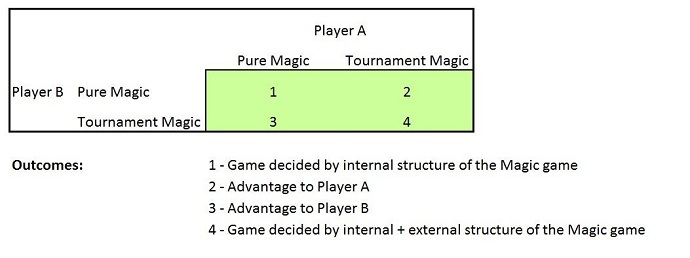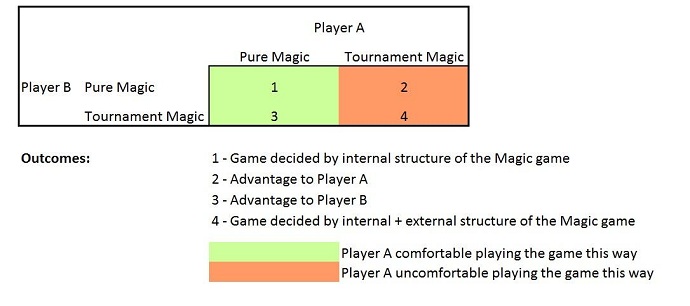On Friday, October 19th, a professional Magic player was disqualified from the Pro Tour for what the judges called “Fraud/Cheating.” The situation seems to have been infinitely more complicated than a simple case of cheating, though, as her excellent follow-up article explains. In her particular case, there was a reasonable amount of ambiguity as to what each player’s responsibility was in terms of the game state.Ã’Â
This article is not intended to assess or analyze that situation in any more detail. Instead, the fact that such a complicated situation could arise due to tournament regulations at the Pro Tour level suggests that we might benefit from a specific angle of meta-analysis focused on the nature of tournament Magic play.Ã’Â
We might ask why there are different perspectives on the appropriate way to approach competitive matches of Magic.
In order for this to make sense, we have to begin by agreeing on what two ideas mean: prisoner’s dilemma and tournament Magic.
Prisoner’s Dilemma
This is a classic example of decision making that has evolved through a variety of different interpretations of game theory. We’ll use the most basic example for this article.Ã’Â
Imagine two prisoners, totally separate from one another in different interrogation rooms, who committed a crime together (such as robbing a bank). As of now, all the investigators have on them is the fact that they threw cigarettes in the street prior to entering the bank, so they can be charged with a misdemeanor. Both prisoners know that if they don’t say anything to the investigators, the worst that will happen to them is a few months in prison on trumped-up littering charges (outcome 1).Ã’Â
However, the investigators offer each prisoner a deal. The first prisoner who confesses to the joint robbery and implicates the other will receive no jail sentence whatsoever and will be free to go, though his or her partner will receive a significant jail sentence of eight years (outcome 2, going free, and outcome 3, going to jail for eight years). However, if both prisoners confess within the same relative timeframe, investigators will send both of them to jail for three years (outcome 4).
Graphically, we see this:
Â

Â
The two important things to remember are that neither prisoner knows what the other will choose and that there is a definite hierarchy of outcomes in that 2 > 1 > 4 > 3. The prisoners would most like to be free, then to spend only a few months in jail, then to spend only three years in jail, and last to spend eight years jail.
Let’s put this aside for a moment to focus on some other definitions.
Tournament Magic
Although there are nearly infinite types of Magic that can be played, when it comes to sanctioned tournaments, the approach that players tend to take lies on a continuum. I’m going to discuss two kinds that lie on opposite ends of the spectrum: pure Magic and tournament Magic.
Â

Â
Example: Player A is playing Valakut in Standard, and Player B is playing Boros Aggro. Player B will win if he untaps, but it’s currently Player A’s turn. Player A resolves a Primeval Titan and searches her library (assume that a search yielding two Mountains will be lethal to Player B).She pulls out one Mountain then pauses to think, setting her deck down where it had normally been sitting during the game, and then tries to pick it back up to fetch the second Mountain.
- Response closer to the “tournament” orientation: By setting the deck down in that spot, Player A has indicated that she has resolved the search ability from Primeval Titan and has selected to find only a single Mountain. Player B calls a judge to assert that Player A has fully resolved the Primeval Titan trigger.
- Response closer to the “pure” orientation: No other actions have been resolved and Player A was clearly thinking, so the Primeval Titan’s ability is still in the process of resolving. Player B allows the trigger to resolve for two Mountains and loses the game.
We do not presuppose that either response is more correct or better than the other since that isn’t the purpose of this exercise. Rather, we simply recognize that there are two functional ways to interpret an ambiguous situation such as the one described above and that those different responses are emblematic of two roughly characterized paradigms in the current Magic environment.
Players who take a tournamentÃ’Â-style approach in a given event will be more likely to use the rules as written (i.e., the “letter of the law”) to attempt to win a game. If a player accidentally or carelessly indicates that he has resolved an ability partially, the tournament-style approach will use judging staff to attempt to enforce the suboptimal partial resolution.Ã’Â
Players who take a pure-style approach in a given event will be more likely to give leeway to their opponents in an ambiguous situation. Viewing “letter of the law” interpretations as being external to the fundamental game of Magic (hence the “pure” label), the pure-style approach is more hesitant to invoke the letter of the law to obtain an advantage.
Magic’s Prisoner’s Dilemma
If we agree that there are two sides to a continuum of how players approach Magic games in a given tournament, then we might observe that each match of Magic places both players in a strange variation of the Prisoner’s Dilemma.
Â

Â
In terms of achieving the desired outcome of the game (winning), this model suggests that a player should always play tournament-style Magic because there is either a chance to obtain an advantage (outcomes 2 or 3) or no cost for doing so (outcome 4). Currently, the only way to be disadvantaged in terms of one’s approach to Magic play at tournaments is to adopt the pure-style approach, which has the potential to put one at a disadvantage but no potential to generate an advantage. The one exception to this is that “riding the line” of the rules extraordinarily hard sometimes can produce ambiguity that results in a judge ruling against the player doing so.
If we accept that a favorable outcome to the game or match is the primary force driving a player’s decisions within the context of a tournament, then reasoning players (which almost by definition includes all Magic players) should choose the tournament-style approach to each contest.
We know, though, that not everyone does this. In fact, a large number of players choose to adopt the pure-style approach at different times and for a variety of different potential reasons.
Significance of the Outcome: Many players vary where they are on the continuum based on how much they value the outcome.
Â

Â
At FNM, where only several booster packs are on the line, players may be more willing to allow the rules to slip. In fact, the DCI encourages this approach to Magic by having an entirely different set of rules for this level of play. As the stakes get higher and higher until tens of thousands of dollars are on the line, it becomes more and more reasonable to take the approach that’s more likely to produce a positive outcome.
Beliefs External to Outcome Analysis: There are some players who believe that the tournament-style approach, whatever the potential rewards, is unsporting or unethical. For these players, the calculus of where to fall on the continuum is entirely dependent on the size of the reward and on the effect that their behavior will have on their ability to win a given gameâ⒬”their perspective rests on things that are external to the entire equation. This raises an entirely different perspective than the one proposed in this article because it asks whether traditional values and beliefs are suspended within the context of a game for which they can be suspended.Ã’Â
In other words, let’s assume that someone’s values are “never lie under any circumstances,” but then they get involved in a casual playground game of “lie to win.” It’s understood that everyone in the game is lying and the purpose of lying in the game is not to deceive but to follow the rules of the gameâ⒬”there are no consequences for this deception. How does such a person approach this game?Ã’Â Ã’Â
Any of a Variety of Other Reasons: It’s difficult to categorize all the reasons why a person might do anything.Ã’Â
Why Is This Like the Prisoner’s Dilemma?
A foundational principle of the Prisoner’s Dilemma is that there are four hierarchically ordered consequences for an individual’s actions and the individual wants to optimize his or her chances to obtain a more favorable outcome. In the case of the Magic Dilemma that we discussed above, there only appears to be three outcomes: advantage to self (either option 2 or 3) > neutral game (either option 1 or 4) > advantage to opponent (the option of 2 or 3 not already taken). As we’ve acknowledged, though, a large number of players choose to adopt the pure-style approach at different times and for a variety of different potential reasons. This means that there is a third dimension to the Magic Dilemma:
Â

Â
In a circumstance where Player A is uncomfortable with the tournament-style approach to Magic but Player B is not, then Player A also is forced to make a separate hierarchical decision between personal comfort (be it due to personal values or another reason) and optimization. For Player B, the hierarchy of outcomes is still 3 > 1 or 4 > 2. For Player A, the hierarchy might be 1 > 3 > 4 > 2 or might be 1 > 2 > 4 > 3, depending on the balance of that player’s values.
Some players will reasonably argue that at the highest levels of tournament play, the rule of law and optimization process should be paramount, as this is how the tournament structure has been designed. Other players might respond by asking the point at which this is appropriate (are the DCI’s levels of separation for rulings adequately spaced?) or by suggesting that even at the highest levels adherence to minutiae external to the game is unsporting. Both perspectives have very persuasive adherents, and both have made good arguments.
What is of paramount importance is that we, as a Magic community, acknowledge that this dilemma exists in some shape or form because it does have a potentially serious effect on a certain segment of players.
Â
